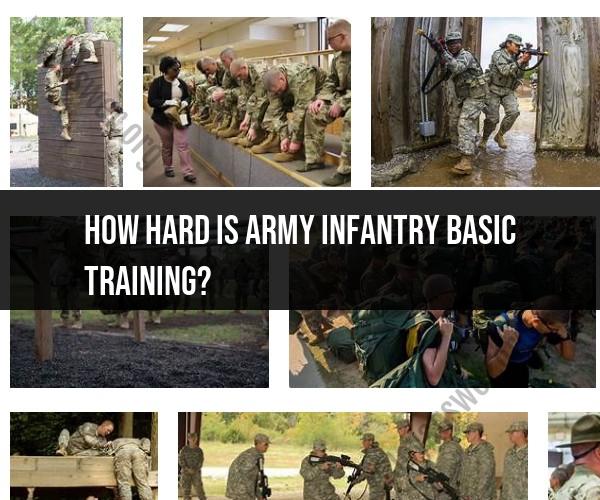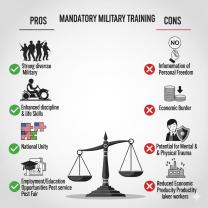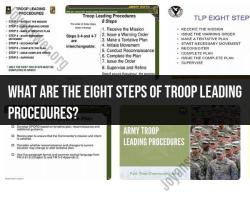How hard is Army infantry basic training?
Army Infantry Basic Training is known for its physical and mental challenges. It's demanding, but it's designed to prepare recruits for the rigors of infantry life and combat situations. The difficulty of Infantry Basic Training can vary from person to person, depending on factors like physical fitness, mental preparedness, and individual resilience. Here are some key aspects that contribute to the perceived difficulty:
Physical Demands: Infantry training involves rigorous physical training, including running, marching, obstacle courses, and carrying heavy loads. Recruits are expected to meet and maintain certain physical fitness standards.
Mental Toughness: Infantry training pushes recruits to their mental limits. This includes stress drills, sleep deprivation, and simulated combat scenarios. Mental resilience and the ability to stay focused under pressure are essential.
Long Hours: Recruits often face long, demanding days that start early and end late. The intensity of training can be mentally and physically exhausting.
Field Training: Infantry training includes extensive field exercises where recruits learn essential combat skills like patrolling, marksmanship, and tactical maneuvers. These exercises can be physically grueling and mentally challenging.
Weapons Training: Handling and maintaining weapons is a critical part of infantry training. Recruits must become proficient in various firearms and weapons systems.
Teamwork: Infantry units rely heavily on teamwork and cohesion. Recruits must learn to work together effectively under stressful conditions.
Drill and Ceremony: Learning and performing drill and ceremony movements with precision is an important part of military discipline and is often part of daily training routines.
Adaptability: Recruits must quickly adapt to changing situations and follow orders. Adaptability and the ability to learn and apply new skills are crucial.
Testing and Evaluations: Recruits are regularly tested and evaluated on their knowledge, skills, and physical fitness. Failure to meet standards can result in additional training or dismissal from the program.
Instructors and Leadership: Drill sergeants and instructors play a significant role in shaping recruits. They use a combination of motivation and discipline to prepare recruits for their roles.
It's important to note that while Infantry Basic Training is challenging, it is designed to be achievable. Recruits receive training and support to help them succeed, and many individuals who initially struggle find that they become stronger, both physically and mentally, as they progress through the program.
Individual experiences will vary, but for those who successfully complete Infantry Basic Training, it can be a source of pride and a foundation for a successful career in the military. It's crucial for recruits to arrive prepared, both physically and mentally, and to maintain a positive attitude and a commitment to the training process.
Army Infantry Basic Training: Challenges and Expectations
Army Infantry Basic Training (BCT) is a 22-week intensive training program that prepares Soldiers for the physical, mental, and emotional demands of combat. BCT is one of the most challenging training programs in the world, and it is not for everyone.
Here are some of the challenges that Soldiers face during BCT:
- Physical demands: BCT is physically demanding, and Soldiers are expected to be in excellent physical condition. They will participate in rigorous physical training, including running, marching, and obstacle courses.
- Mental demands: BCT is also mentally demanding. Soldiers are required to learn a great deal of information in a short period of time, and they are also subjected to stress and sleep deprivation.
- Emotional demands: BCT can be emotionally challenging. Soldiers are away from their families and friends, and they are constantly being pushed to their limits.
Here are some of the expectations that Soldiers have during BCT:
- To be physically fit: Soldiers are expected to be in excellent physical condition when they arrive at BCT. They will be tested on their physical fitness early on, and those who do not meet the standards will be at risk of being discharged.
- To be disciplined: Soldiers are expected to follow orders and to be disciplined. They will be punished for breaking the rules, and they may be discharged for serious violations.
- To be motivated: Soldiers are expected to be motivated and to have a strong desire to serve their country. BCT is a challenging program, and those who are not motivated are likely to struggle.
Surviving Army Infantry Basic Training: What to Prepare For
Here are some tips on how to survive Army Infantry Basic Training:
- Be physically prepared: The best way to prepare for BCT is to be in excellent physical condition. Start exercising regularly well before you arrive at BCT.
- Be mentally prepared: BCT is mentally demanding, so it is important to be prepared for the challenge. Talk to your recruiter or to other Soldiers who have been through BCT to get an idea of what to expect.
- Be motivated: It is important to have a strong desire to serve your country and to complete BCT. BCT is a challenging program, but it is possible to succeed if you are motivated.
The Grueling Path of Infantry Basic Training: How Tough Is It?
Army Infantry Basic Training is one of the most challenging training programs in the world. It is physically demanding, mentally demanding, and emotionally demanding. Soldiers are expected to be in excellent physical condition, to be disciplined, and to be motivated.
BCT is not for everyone, but it is possible to succeed if you are prepared for the challenge. Be sure to talk to your recruiter or to other Soldiers who have been through BCT to get an idea of what to expect.













